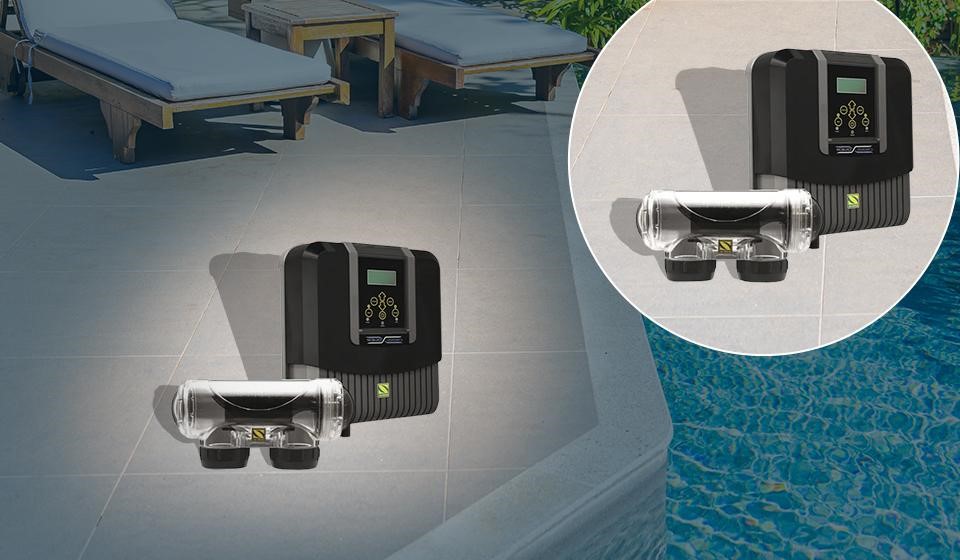For those looking to keep their swimming pools sparkling clean without the hassles of traditional chlorine, salt water chlorinators provide an appealing option. But how exactly do these increasingly popular devices work their magic? This guide will explain to you exactly what they do and what benefits they can offer you and your family.
What is a Salt Water Chlorinator and How Do They Work?
A salt water chlorinator is an add-on device connected to a pool’s pump and filter system. It uses a process called electrolysis, where a salt cell inside the chlorinator turns saltwater into chlorine before sending it back into the pool.
Rather than manually measuring, mixing, and adding large amounts of chemicals, you simply add salt to the pool when needed and the chlorinator handles chlorine production automatically. This is an extremely efficient process that requires little energy and effort on the part of the user. The benefits don’t stop there, either.
Why Do I Need a Salt Water Chlorinator?
Salt water chlorinators provide several key benefits over using traditional chlorine:
- Convenience and Ease of Use – Once installed, they operate automatically with little maintenance, besides occasionally checking salt levels. No more constant trips to the store for liquid or tablet chlorine.
- Smooth Chlorination – The steady conversion of salt to chlorine results in stable sanitiser levels. No more eye-burning, smells or spikes that are caused by direct chlorine addition.
- Cost Savings – Although the initial investment is greater, the long-term expenses for salt are more economical compared to continuously purchasing chlorine. These systems can endure for 5-10 years, providing a budget-friendly solution for your pool.
- Healthier Water – The chlorine generated in this process is pure and doesn’t have any harsh byproducts found in direct chlorine addition methods. As a result, the water feels exceptionally smooth and silky.
- Gentler on the Environment – Salt water chlorinators are often praised for their gentler impact on the environment. Since they rely on salt and electricity to generate chlorine, there’s no need to handle or store harsh chemicals that minimise the risk of accidental spills or exposure.
What Should I Look for in a Salt Water Chlorinator?
- When purchasing a salt water chlorinator, you’ll want one with robust features that can withstand harsh conditions.
- They utilise self-cleaning cells that require little maintenance from the user.
- They use platinum-coated titanium to enhance the longevity and durability of the electrolysis cell in corrosive environments.
- They have an easy-to-read touchpad control panel for simple operation.
- They come with at least a 2-year warranty. This protects against early cell failure or manufacturing defects.
You don’t have to worry about noise, either. The “Salt-Smart” series operates practically silently, allowing installation along property lines or near the home without disturbing neighbours or family.
Choosing the Right Salt Water Chlorinator
Consider factors such as pool size, chlorine output, and energy efficiency. Reputable manufacturers like AstralPool, Pentair, and Zodiac offer a wide range of options to suit various pool sizes and needs.
Maintaining Your Salt Water Chlorinator
Monitoring Salt Levels
Like any pool equipment, saltwater chlorinators require regular maintenance to ensure optimal performance and longevity. One of the most important tasks is monitoring and adjusting the salt levels in your pool water. Ideally, you’ll want to maintain a salt concentration between 2,500 and 3,500 parts per million (ppm) for optimal chlorine production.
Cleaning the Chlorinator Cell
Additionally, it’s essential to clean and inspect the chlorinator cell regularly. Over time, calcium and mineral deposits can build up on the cell, reducing its efficiency and potentially leading to premature failure. Following the manufacturer’s recommended cleaning schedule and using the appropriate cleaning solutions can help extend the life of your chlorinator cell.
The Importance of Professional Installation
While salt water chlorinators are designed for user-friendliness, their proper installation and setup are crucial for achieving optimal performance and longevity. Engaging a professional pool service or experienced technician can ensure that your chlorinator is correctly sized for your pool, installed according to manufacturer guidelines, and configured for efficient operation.
Professional installers can also provide valuable guidance on maintaining your salt water chlorinator, addressing any potential issues, and ensuring that you get the most out of your investment.
In a Nutshell
Whether you’re an existing pool owner looking to keep your water crystal clear or a newcomer to the world of backyard oasis maintenance, a saltwater chlorinator might just be the solution you’ve been searching for. Eliminating the need for harsh chemicals and minimizing the risk of accidental spills or exposure, these innovative systems contribute to a healthier environment for both you and your family. If you are still confused, talk to your local pool professional to explore whether a chlorinator system is right for keeping your backyard oasis healthy and sparkling clean.
















